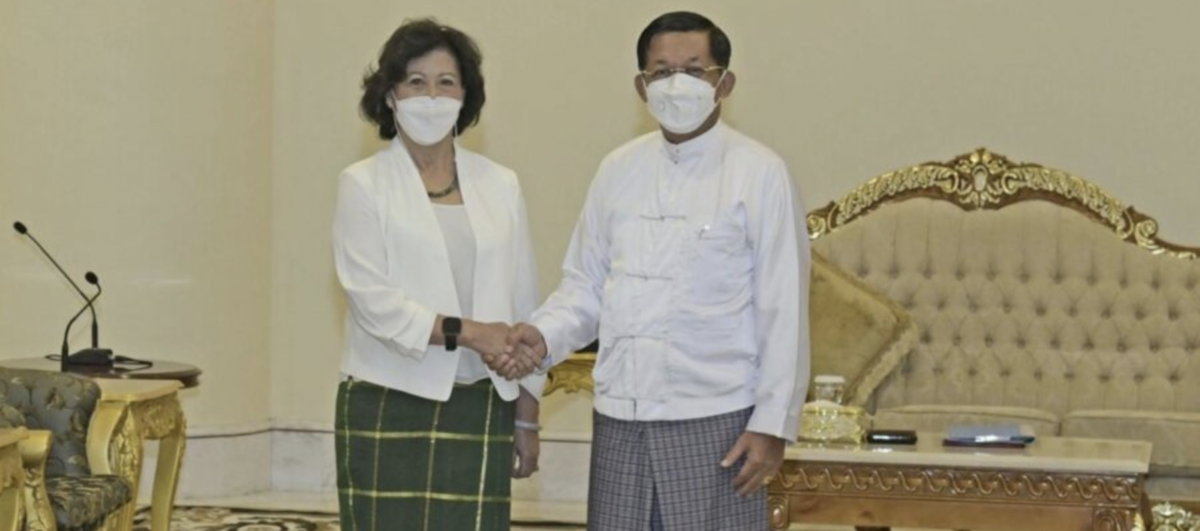SAC-M’s 19 August statement quoted in The Irrawaddy.
A Brief History of the UN’s Failed Missions in Myanmar
By THE IRRAWADDY
22 August 2022
Last week’s meeting between UN special envoy Noeleen Heyzer and the Myanmar junta chief ended without any breakthrough, becoming yet another failed UN mission to the country, one of many involving the world body’s diplomats and military rulers of Myanmar since 1990.
Rather, regime chief Min Aung Hlaing took the meeting as an opportunity to personally vent his discontent at the UN, as well as to lecture the envoy, according to a transcript of the meeting the regime released on Friday in response to the envoy’s statement, which the regime said was “one-sided” and “created misunderstanding about Myanmar.” In her statement after the meeting on Aug. 17, the envoy outlined the discussion and said the meeting didn’t in any way confer legitimacy on the regime.
According to minutes of the meeting, Min Aung Hlaing expressed his displeasure at the world body’s refusal to recognize the regime’s representative, among other things. He also told a barefaced lie, claiming that “Myanmar has gained stability”, which he said made it hard for him to understand why the UN has issued many statements expressing concerns about the country. He told Heyzer that it would be more appropriate to make comments on Myanmar only after gaining an understanding of the real situation in the country, and criticized her decision to take a flight from Yangon to Naypyitaw, saying she missed an opportunity to see the situation on the ground by traveling in a car. Plus, contradicting mounting evidence, he denied his troops were torching civilian homes.
In short, the envoy returned from Myanmar barehanded after enduring an hours-long dressing-down on various topics from Min Aung. She was given a low-grade reception and used by the junta to promote its legitimacy, something it has been internationally denied. She outdid her predecessors, however, by prompting the regime to release a transcript of the meeting, which was unprecedented.
The meeting between the UN special envoy and Myanmar regime leader was the UN’s latest attempt to mediate peace in the country, which has been consumed by conflict sparked by the military coup last year.
But it failed, just as all the world body’s previous efforts in the country did, especially those dealing with the country’s military rulers over the past more than 30 years.
The UN has appointed a series of envoys on Myanmar since 1990, when the country was under military rule after the failed pro-democracy uprising in 1988.
It started with Japanese diplomat Sadako Ogata, who was appointed as an independent expert by the UN Commission on Human Rights.
Her successors included Malaysian businessman Razali Ismail and Nigerian diplomat Ibrahim Gambari, who tried to create a dialogue between then junta chief Than Shwe and detained opposition leader Daw Aung San Suu Kyi.
Razali, who served from 2000 to 2006, made 12 visits and Gambari traveled to Myanmar at least four times. But both failed to bring tangible results.
When the Malaysian diplomat quit in 2006, he told The Irrawaddy, “It is best to conclude that I have failed.” Some of the UN envoys brought with them conflicts of interest that tainted the public’s perception of them. Rumors circulated that some UN envoys took “boxes of presents” from the generals. Some Myanmar people called Gambari “kyauk yu pyan,” which means “one who takes gems and then leaves,” according to The Associated Press.
A Malaysian company headed by Razali, IRIS Corp, even clinched a business deal with the military government, selling high-tech passports to the regime.
Then came Heyzer’s predecessor Christine Schraner Burgener. In September last year, shortly before her term as the UN Secretary General’s special envoy on Myanmar was to end, the Swiss diplomat tweeted that her efforts to facilitate an “all-inclusive dialogue in the interest of the people were not welcomed by the military.” In other words, she confessed that her months-long attempts, in the wake of the takeover, to persuade the coup leaders in Naypytaw to engage in dialogue to settle the political and social turmoil caused by the coup had failed.
Heyzer began her duties in December 2021. Unlike her predecessor, she was invited by Min Aung Hlaing to visit the country. But like all the envoys before her, she failed the Myanmar people.
Her failure highlights one of the UN’s historic problems: its lack of muscle, especially in dealing with such a repressive country. It has now been 32 years that the UN has failed the Myanmar people by sending one envoy after another. It must take harsher approaches to the regime. If not, the world body will merely be a thing of ridicule, not only among Myanmar people but to Min Aung Hlaing himself.
In the wake of the meeting, the Special Advisory Council for Myanmar (SAC-M), a group of former UN experts on the country, urged Heyzer to engage more with Myanmar’s parallel National Unity Government (NUG) instead. While meeting with Min Aung Hlaing may have been essential to the special envoy in attempting to fulfil her mandate, it said, “It is clear that nothing of significance will come of it.”
SAC-M member Yanghee Lee, a former UN special rapporteur on Myanmar, said Heyzer must now be looking forward to formally engaging with the NUG, which was formed by the elected lawmakers of the ousted National League for Democracy and their ethnic allies, and commands the loyalty of the vast majority of Myanmar people.
“She must go the extra mile to find a solution acceptable to the peoples of Myanmar,” Lee said.


